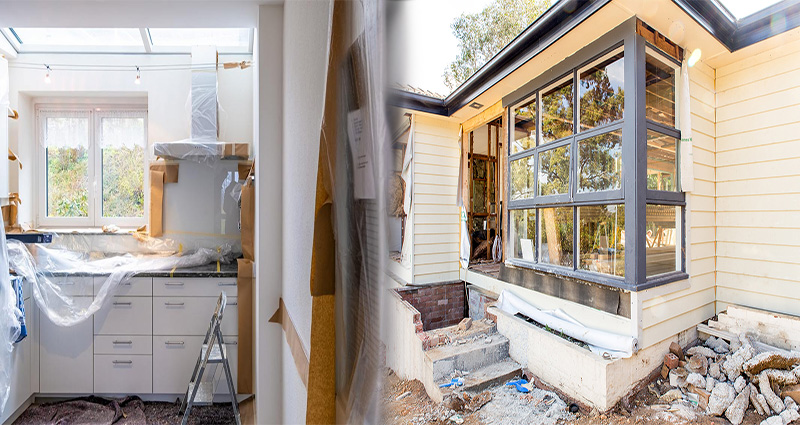When you decide to renovate your house, it’s important to do it right. You want the renovations to increase the value of your home and make it more comfortable for you and your family. But there are many ways that things can go wrong if you don’t plan properly or hire the right contractor. In this post, we’ll outline some tips that will help keep you on track toward a successful renovation project.
Make a plan.
The first step to renovating your house is to make a plan. You need to define the problem before you can start on a solution, and this is especially true when it comes to home renovation projects.
If you don’t know where you’re going, how will you know when or if you get there? The answer lies in setting goals before starting on your renovations: What do YOU want out of this project? Are there any problems with the way things are now that could be fixed by doing some remodeling? What would make life easier for everyone living under one roof (including pets)? These questions are important because they help determine what direction we should go in order achieve our larger vision for improving our homes–and our lives!
Plan to spend more than you think you need to.
The biggest mistake you can make is to try and save money by cutting corners. If you want your house to look great, then plan on spending more than you think is necessary. You will be glad that you did later on when people come over and compliment the way the house looks!
On a related note: don’t skimp on labor costs either (like hiring less skilled workers or paying them less). The more skilled people working on a project, generally speaking, the better results they will produce for less cost per hour spent working on it–and this is true whether or not we’re talking about professional contractors or friends who are helping out as volunteers.”
Have an architect or contractor walk through and make notes on what work needs to be done.
When you’re ready to start renovating your house, it’s important that you have a plan of action. Before any work begins, make sure that an architect or contractor walks through the house and makes notes on what work needs to be done. They can help identify any structural issues and advise on how best to proceed with renovations without breaking the bank.
You should also make sure that any contractors who come into contact with your home are licensed professionals who carry insurance policies in case there are accidents during the renovation process (which is more likely than not). This will allow them access inside your home so they can complete their jobs safely and efficiently!
Know the market value of your home, so you can figure out if it makes sense financially to renovate.
Before you start a renovation, it’s important to know the market value of your home. That way you can figure out if it makes sense financially to renovate. You can get an appraisal from an appraiser or real estate agent who specializes in appraisals (and they’re not all the same). The cost and time required will vary depending on where you live; here are some examples:
- $300-$600 for a basic appraisal in Portland, OR
- $250-$350 for a full appraisal in Seattle, WA
Don’t forget about permits and inspections.
- Don’t forget about permits and inspections.
If you don’t have the right permits, you could end up with a big fine. You need to know what permits you need and when to get them–and who to call for help with that process.
Consider hiring a designer who doesn’t have a financial stake in your project.
If you’re planning on doing your own renovations, it can be helpful to have a designer on hand. A good designer will help you figure out what look and feel you want for your home, but they won’t be able to give specific advice about how to achieve that vision. You’ll still need an architect or contractor who knows how much things cost and where best to put things in order for them not only look nice but also function properly (for example: if there’s no room between two windows then they won’t open).
For example: if there’s no room between two windows then they won’t open.
Work with contractors who are licensed, insured and competent.
- Hire licensed contractors.
- Hire insured contractors.
- Hire competent contractors.
- Check references, licenses and insurance before you hire any contractor for your home renovation project.
Don’t skimp on fixtures and materials like appliances, cabinetry, windows and flooring that add value to your house for resale later on.
- Appliances
- Cabinetry
- Windows
- Flooring
You don’t want to do this wrong and end up regretting it later
If you’re thinking about renovating your home, there are a few things you need to consider. For example:
- It’s a big project that will take time and money. If you don’t want to make mistakes or waste money on something that doesn’t work out, then do your research first!
- You need to be sure that what you’re doing will sell later on when it’s time for someone else (or even yourself) to buy this house again.
- Don’t get stuck with a house that no one wants because of all the renovations done on it by previous owners who didn’t have their eye on selling back then but maybe should have thought about how much work would be involved later down the road when trying desperately not only sell but also get rid of everything inside those walls too!
If you’re thinking about renovating your home, we hope this guide has been helpful. We know it can be overwhelming, but if you take it one step at a time and do your research before starting on any project, then you’ll be well on your way to success.











